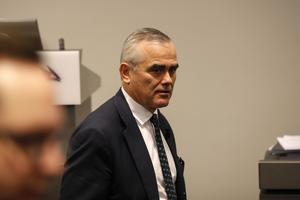 Credit Suisse CEO Thomas Gottstein in Zurich on Feb 13, 2020. (STEFAN WERMUTH / BLOOMBERG)
Credit Suisse CEO Thomas Gottstein in Zurich on Feb 13, 2020. (STEFAN WERMUTH / BLOOMBERG)
Credit Suisse Group AG is setting aside more than US$1 billion to cover writedowns and provisions for bad loans, the biggest such hit in more than a decade as the coronavirus pummels economic activity across the globe.
The bank is holding back 568 million Swiss francs (US$585 million) for credit losses, almost triple what analysts had been expecting, and is taking 444 million francs in charges to cover lower asset prices.
Switzerland’s second-largest lender joined US banks in taking an upfront hit, and is the first to show how European lenders fared during an unprecedented and volatile quarter
The Swiss bank reported profit and trading results that exceeded analysts’ expectations, although warned that the pain from soured loans may continue beyond the first quarter.
Switzerland’s second-largest lender joined US banks in taking an upfront hit, and is the first to show how European lenders fared during an unprecedented and volatile quarter.
Widespread lockdowns hit corporate clients and whipsawed markets last month, and the full implications of the outbreak have yet to be fully felt as governments around the world debate the duration of shutdowns.
Chief Executive Officer Thomas Gottstein, a 20-year Credit Suisse veteran and its first Swiss chief in almost two decades, is facing an extraordinary turn of events since taking over just two months ago and which may throw the bank’s best-laid plans into disarray.
As the investment bank did worse than expected in the first quarter, Gottstein is relying on the performance of the key trading and wealth management businesses.
“In my first quarter as CEO of the group we all witnessed a highly challenging environment with a severe impact from the COVID-19 pandemic,” Gottstein said in the statement. “We delivered a resilient performance, while absorbing a significant reserve build of over 1 billion francs.”
Credit Suisse rose as much as 1.4 percent in early Zurich trading and was up 0.9 percent as of 9:04 a.m. The stock has lost about 41 percent so far this year after a period that saw stock markets pummeled because of the virus.
ALSO READ: EU leaders to take step to joint financing of post-virus recovery
The bank’s key trading business did better than expected on revenues and pre-tax profit as volatility boosted client activity, though stopped short of gains at US peers.
Global markets posted 1.63 billion francs of revenue, while pre-tax income jumped almost a fifth. The bank said its CET1 ratio, a core measure of financial strength, is set to slip this year because of the reserve build.
The Asia wealth management business booked 96 million francs in provisions for credit losses related to three single cases, the largest of which related to a Chinese food and beverage company, the bank said.
The unprecedented slump in crude prices also accounted for a significant portion of the provisions taken at the investment banking business as companies drew down on loan commitments and the economy deteriorated.
READ MORE: Global cost of coronavirus could reach US$4.1 trillion, ADB says
Credit Suisse -- which follows US accounting standards -- is joining peers across the Atlantic taking the pain upfront, with lenders such as JPMorgan Chase & Co. and Wells Fargo & Co. posting their highest provisions in at least a decade.
Still, the bank said the impact of the pandemic on financial results remained difficult to assess. It has frozen plans to buy back as much as 1.5 billion francs (US$1.53 billion) of shares this year due to economic uncertainty caused by the coronavirus. It is also withholding part of the 2019 dividends until the second half, acknowledging that the real test for the financial system won’t come until later.
Banks are building up their reserves as they brace for a severe recession and an increasing number of defaults, though it remains to be seen how many of Credit Suisse’s European peers will follow suit.
European banks may seek to avoid setting aside billions of euros to cover bad loans or at least stagger some of the pain over several quarters, though Italy’s UniCredit SpA said on Wednesday that it will take 900 million euros of provisions.


